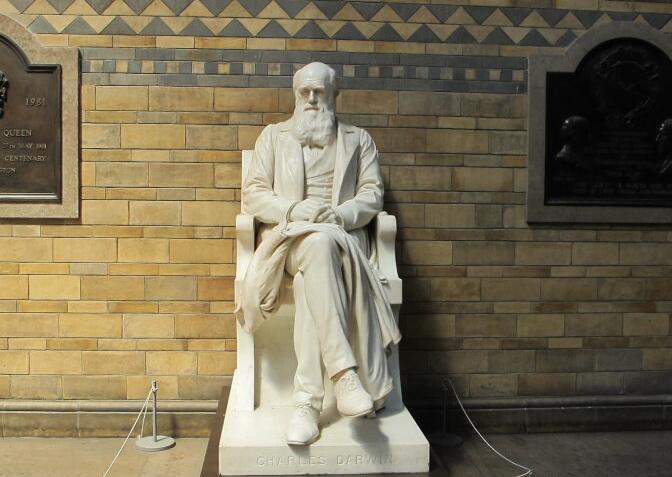Still, his altruism in general toward his fellow man did not deflect him from more personal rivalries. One of his last official acts was to lobby against a proposal to erect a statue in memory of Charles Darwin. In this he failed—though he did achieve a certain belated, inadvertent triumph. Today his statue commands a masterly view from the staircase of the main hall in the Natural History Museum, while Darwin and T. H. Huxley are consigned somewhat obscurely to the museum coffee shop, where they stare gravely over people snacking on cups of tea and jam doughnuts.
不过,他对人类的无私精神并没有使他忘记自己的对手。他最后一个正式举动是到处游说,反对一项关于修建纪念查尔斯·达尔文的雕像的建议。他的这次努力没有成功——虽然他无意之中为自己赢得了一个胜利,只是晚了一些。今天,他自己的雕像从自然史博物馆大厅的楼梯上像主人般地俯瞰着下面,而达尔文和赫胥黎的雕像却不大显著地放在博物馆的咖啡店里,以严肃的目光凝视着人们喝茶,吃果酱炸面包圈。

It would be reasonable to suppose that Richard Owen's petty rivalries marked the low point of nineteenth-century paleontology, but in fact worse was to come, this time from overseas. In America in the closing decades of the century there arose a rivalry even more spectacularly venomous, if not quite as destructive. It was between two strange and ruthless men, Edward Drinker Cope and Othniel Charles Marsh.
有理由认为,理查德·欧文那心胸狭窄的对抗行为,标志着19世纪的地质学进入低谷,但更严重的对抗即又发生,这一次来自海外。在那个世纪的最后几十年里,美国也发生了一次对抗,其程度要恶毒得多,尽管破坏力没有那么大。这场对抗发生在两个古怪而又冷酷的人之间:爱德华·德林克·柯普和奥斯尼尔·查尔斯·马什。
They had much in common. Both were spoiled, driven, self-centered, quarrelsome, jealous, mistrustful, and ever unhappy. Between them they changed the world of paleontology.
他们有许多共同之处。两个人都已被宠坏,有紧迫感,以自我为中心,动辄吵架,妒忌心强,不信任别人,老是郁郁不乐。他俩一起改变了古生物学界。












